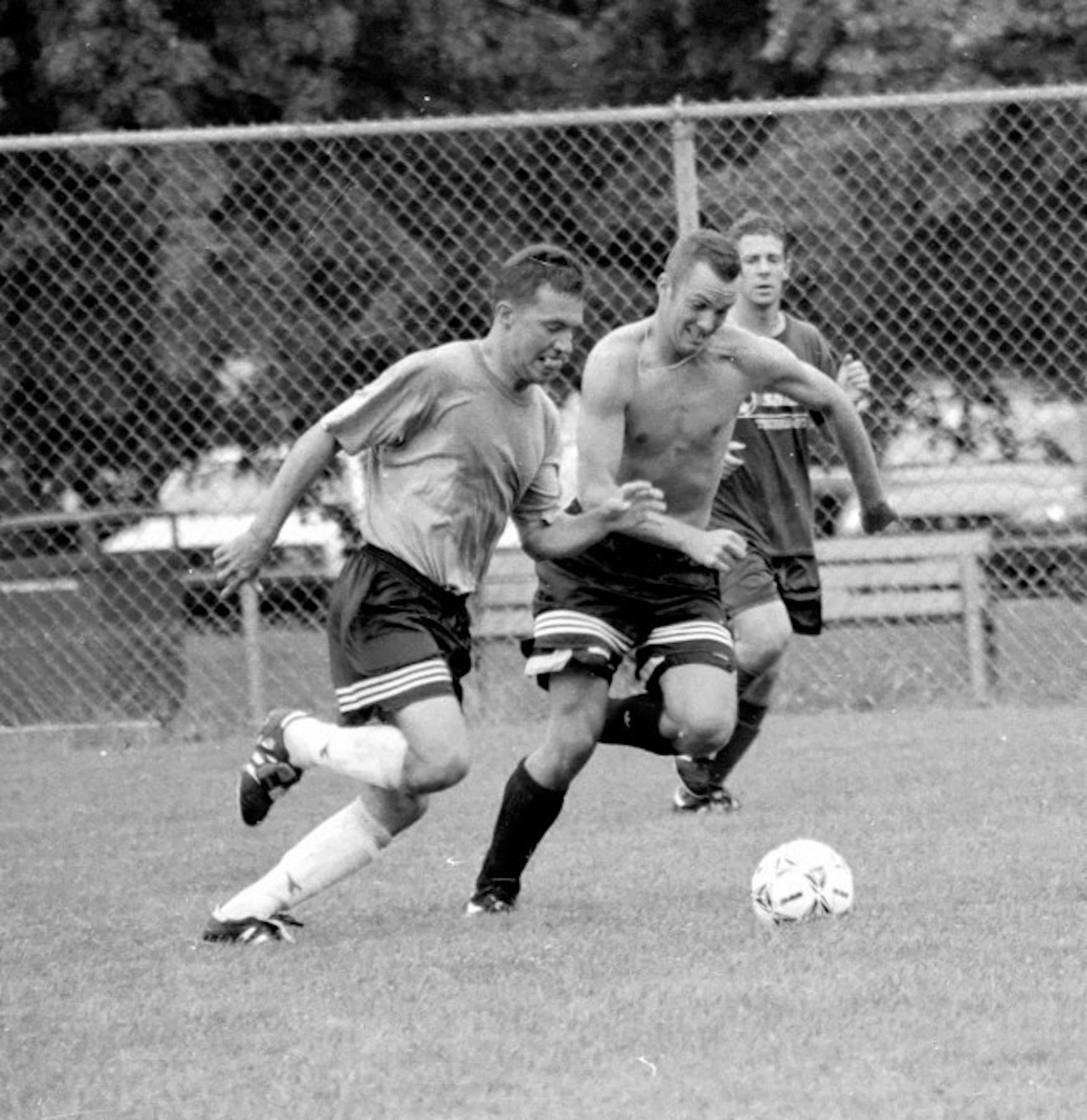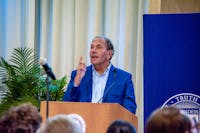From Gordon Field to the Big Leagues
Shaun Oliver '97 has come a long way in the world of soccer. Unlike some former Brandeis men's soccer players who still participate in the sport as high school and college coaches, Oliver has taken on an even bigger role. He has worked in the United States' top-tier league, Major League Soccer, since graduating from Brandeis and is now the director of soccer operations for one of the country's most established clubs, the New York Red Bulls.
"I have to thank Brandeis. [What I do now] isn't why I went to Brandeis," said Oliver, who studied Sociology and American Studies. "But it was because I was at Brandeis that I was able to make something that I couldn't make anywhere else."
American soccer picked up at the right time. When MLS kicked off in 1996, Massachusetts' professional team, the New England Revolution, practiced at Brandeis because its home field, Foxboro Stadium, didn't have proper training fields. Soccer stars like Walter Zenga, Joe-Max Moore, Alexi Lalas and others practiced on Gordon Field and developed a close relationship with Brandeis players and coaches.
"The Revolution were very friendly and professional," current head coach Mike Coven, now in his 38th year coaching men's soccer, recalled. Coven coached both Oliver and his older brother Kris at Brandeis, noting that most players had an up-close look at what the professionals were like.
"It was fun. They used our locker rooms and we gave them a spot downstairs to put their stuff. The pros were very visible and our Brandeis players got to know them. We scrimmaged against [the Revolution] from time to time, or we would go watch them."
Coven said that watching the Revolution train helped him improve how he taught and developed players. But the Revolution's presence did a bit more for Oliver. In 1998, the Revolution had a job opening for an equipment manager and offered it to Oliver, who at the time was working in the equipment room at the Gosman Sports and Convocation Center. The rest is history.
Oliver, originally from Winchester, Mass., started working for his hometown team right out of college, eventually being promoted from equipment manager to team administrator. Oliver's time with the Revolution was cut short when coaching changes overhauled most of the Revolution staff, forcing him to look elsewhere for work. He worked briefly for Special Olympics Massachusetts before taking an administrative position with another MLS team, the San Jose Earthquakes.
And Oliver wasn't completely alone in San Jose, either. When former Revolution defender Alexi Lalas retired in 2003, he took a job as general manager of the Earthquakes. Oliver knew Lalas well because of the relationship they established in New England, which became important once the San Jose franchise relocated to Houston in 2008 after their owners, Anschutz Entertainment Group, were unable to secure a stadium. And when Lalas became president of MLS's New York MetroStars in 2005, Oliver had a place to go.
Oliver nearly faced another staff overhaul in 2006 when the Metrostars were sold to Red Bull GmbH, maker of the popular energy drink. But this time, Oliver was able to stick it out and remain a part of the franchise.
"It was the same as where I'd been in a couple of different situations," recalled Oliver when Red Bull took over. "In sports, people have the people they trust. But you have to find your way through and prove yourself to the new operation."
No team in MLS has had more personnel changes than New York in the last 5 years. But Oliver impressed the new owners and was made part of the MetroStars' makeover. The first major development under new ownership was changing the team name from MetroStars to Red Bull New York.
"The MetroStars had a great name and fans stick to it to this day," explained Oliver. "Red Bull brought in a global view; after all, their product is a global product. But they knew the type of sponsorship and the type of people they wanted."
More changes followed.
When the Los Angeles Galaxy signed David Beckham from Real Madrid in 2007, MLS drastically changed. Foreign stars that were once impossible to sign were now attracted to playing in MLS because they could garner pay comparable to salaries in Europe. This was accomplished because the league amended cap rules that prevented teams from spending over $2 million on salaries, opening the door for investors to scout big name players.
"Beckham's [arrival] greatly affected what some teams could do," added Oliver. "Companies put in a lot of money that they wanted to spend on players that could grow their name. In the past, under old salary cap rules, the MetroStars could only attract players as much as they could. Most of the foreign players they signed before were older."
Today, teams can sign up to three players whose salaries can be higher than the league's salary cap. In April of 2007, the Red Bulls followed the Galaxy's lead, signing Colombian forward Juan Pablo Ángel to a high-sum deal from Aston Villa in the English Premier League. Since then, the team has transformed even further. The Red Bulls were runners-up in their first MLS Cup appearance in 2008 and have continued to invest in foreign stars, adding former Barcelona players Rafael Marquez and Thierry Henry to the fold last season.
Henry alone, who represented France in four World Cups and starred for various big European clubs, has increased the credibility of the Red Bulls and attracted more fans. But the Red Bulls, who were drawing crowds of about 30 thousand at Giants Stadium once the foreign stars arrived, were not happy.
Oliver and other Red Bull Administrators worked to bring a soccer-only stadium to the New York/New Jersey area to house the Red Bulls. Construction began in Harrison, N.J. in 2006 and last March, Red Bull Arena opened its doors.
Today, the 25,000-seat soccerplex that Oliver helped to bring to the Red Bulls is regarded by many as the premier soccer stadium in America. Engineers News Record named Red Bull Arena as the Project of the Year in 2010, and some talk has gone on about making the facility the official home of the U.S. national team.
"We're in a great position now," says Oliver. "The hardest thing for the team was playing in Giants Stadium. There's no atmosphere there, even with 30,000 fans. Now we have the premier building in the country. New York is a destination for everybody."
Oliver was promoted to director of soccer operations for the New York Red Bulls, meaning that he is in charge of the day-to-day running of Red Bull Arena. But Oliver still manages to make it back to Brandeis like many of his fellow men's soccer alumni for the Annual Alumni Soccer Game in August, and he still has a close friendship with Coven and his former teammates.
"I keep in touch with the guys I played with," said Oliver. "Every time we get together, we reminisce about old fights we had and the games we played. I still talk to Coach Coven a couple times a year too. We have a very good relationship. So many people go to the alumni game every year because of him. He always kept an eye out for us. It wasn't just a 4-year relationship. He wasn't only interested that we became good soccer players, but good people too."
"He worked his way up and kept working," Coven said of Oliver. "Highly motivated, very good head on his shoulders. He was a very serious student and player. You knew whatever he was going to go into he'd be successful at."
So what is Shaun Oliver's greatest success?
"I had a child the same week we opened Red Bull Arena. The stadium alone was an achievement. But to have my 4-day-old daughter there the day after the stadium opened made me think, ‘I get to do something I love.'"
"And now I just say, ‘Wow, this is awesome.'"




Please note All comments are eligible for publication in The Justice.